Read next: How to use ChatGPT to supercharge your meetings?
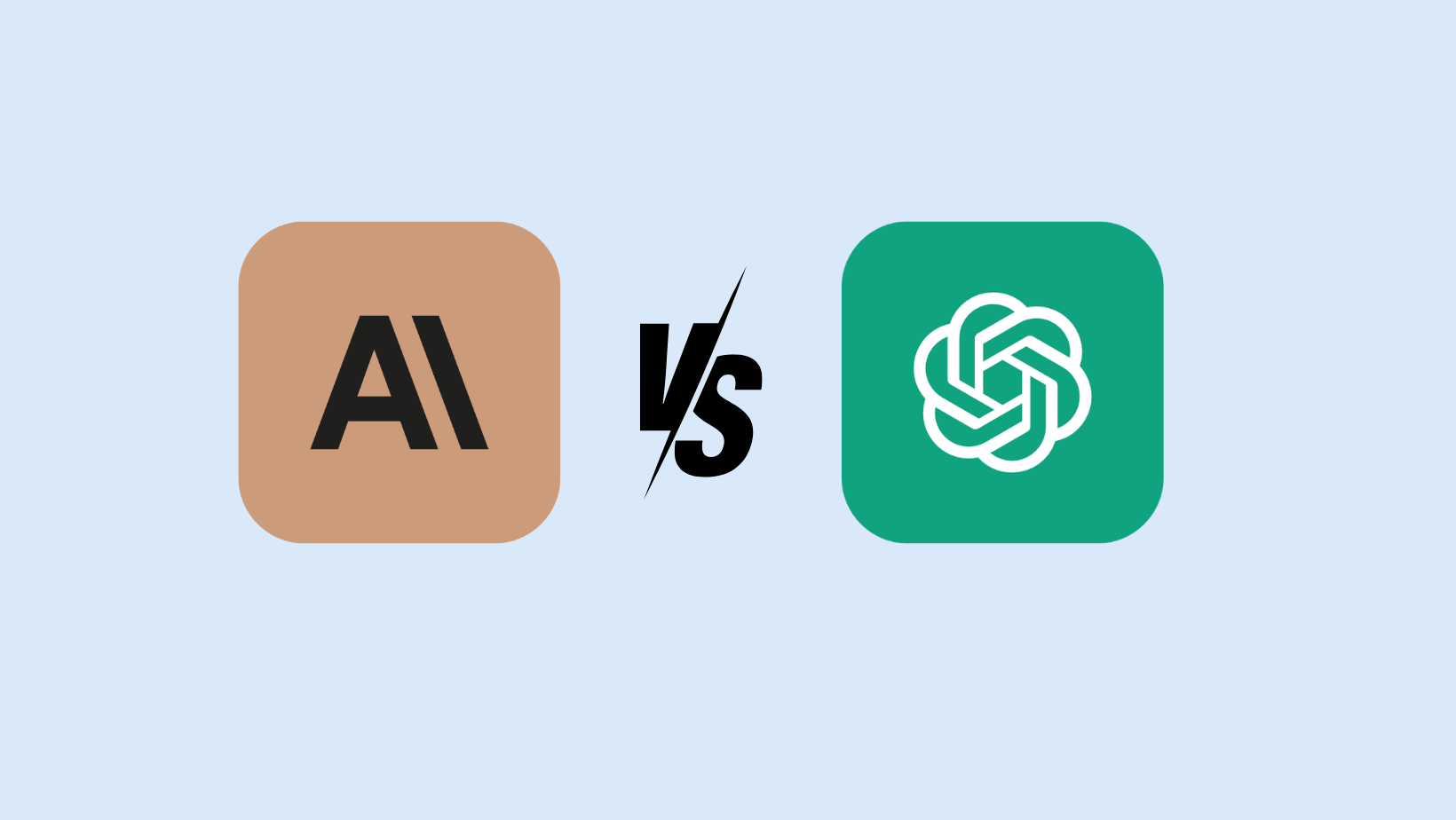
Claude vs. ChatGPT: Which AI Chatbot is the Best
Record, transcribe and summarize conversations with one click.
In my life as a freelancer, I spent a huge amount of time experimenting with what felt like an AI chatbot. And, in my opinion, OpenAI's ChatGPT and Anthropic's Claude are two of the best. ChatGPT and Claude AI are the two of the best AI chatbots available right now — and they mostly work in the same way. Both AI models are trained on millions or billions of data and generate quick outputs.
While they both might look similar at first glance, they definitely differ when performing different tasks. I've spent countless hours exploring these AI chatbots for different use cases to see how they stack up. In my ChatGPT vs. Claude comparison guide, I'll explain the strengths and limitations of these AI tools so you can decide which one is best for you.
What is Claude?
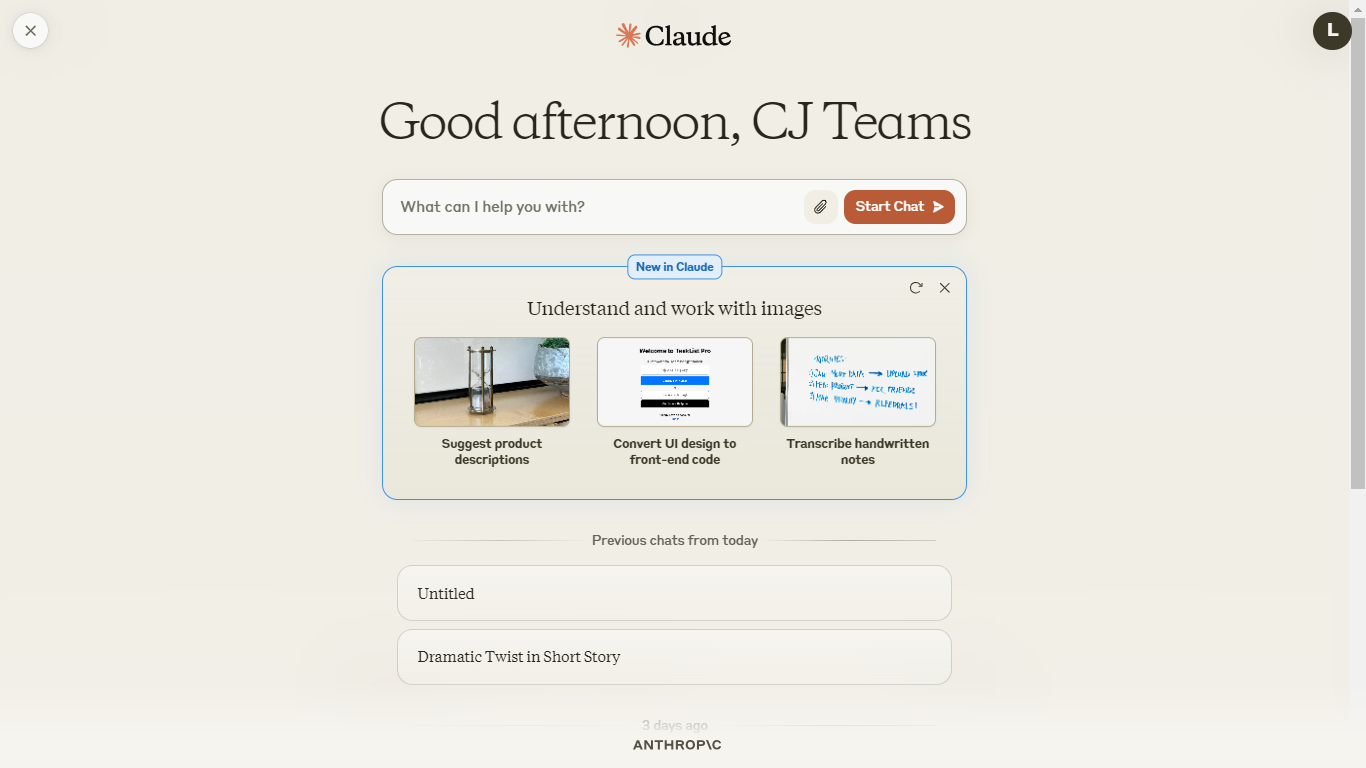
Claude is Anthropic's AI chatbot, which is best known for its high safety standards. Anthropic's Claude has a unique constitutional design that ensures all the generated answers are honest, helpful, and harmless — though hallucinations can occur from time to time.
It can do a lot of cool stuff, such as translating languages, writing creative text, and giving detailed answers to questions. While Claude is available for free, you'll need the Claude Pro version starting at $20 per month for priority access, a 5x usage limit, and additional features.
What is ChatGPT?
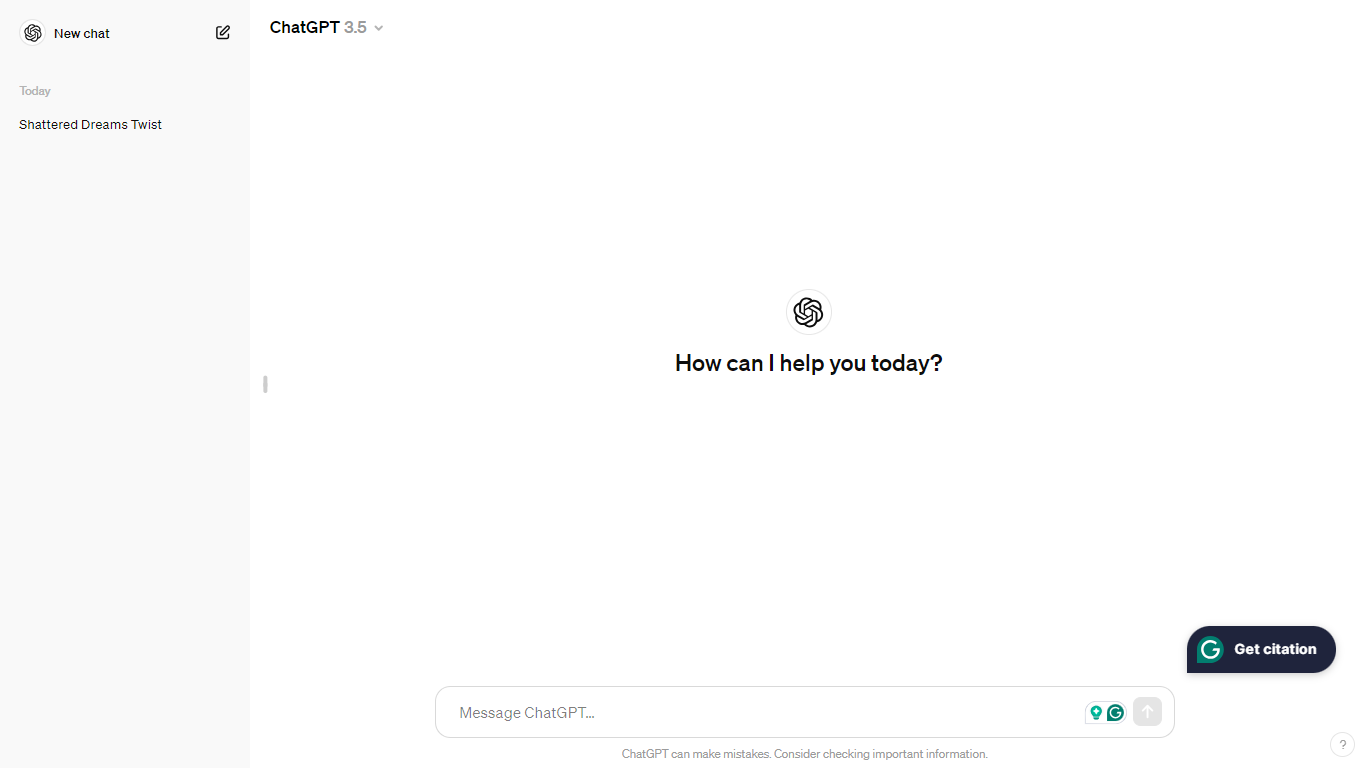
OpenAI released the first version of ChatGPT in late 2022, and it quickly became the fastest-growing application. It amassed over one hundred million users in the first two months.
It's trained on a lot of text and code to help everyone generate answers, write codes, and solve math problems. Unlike other regular chatbots, ChatGPT uses GPT (Generative Pretrained Transformer) for more natural conversations.
While you can use ChatGPT powered by GPT-3.5 for free, you'll need ChatGPT Plus to use the most powerful GPT-4. The paid plan typically starts at $20 per month for professionals and $25 per month for teams, which gives you access to the priority features.
Claude vs. ChatGPT: At a glance
ChatGPT and Claude AI are powerful LLMs that differ in some important ways. For example, ChatGPT was trained up to January 2022, whereas Claude 3 was trained with data up to August 2023, meaning Claude 3 could provide information that ChatGPT could not. In addition, Claude can also access links to summarize contents — though it (sometimes) hallucinates when links are added.
Here's a quick comparison table for Claude vs. ChatGPT that reveals how the AI chatbots differ:
| Parameters | Claude | ChatGPT |
|---|---|---|
| Best Use Cases | Creative tasks, proofing, fact-checking, analysis, and summaries. | Image processing, logic, and reasoning. |
| AI Model | Claude 3 (Opus, Sonnet, and Haiku) | GPT-3.5 and GPT-4 |
| Context Window | 200,000 tokens | 32,000 tokens |
| Integration | Notion AI, Slack, Zoom, Quora's Poe, and DuckDuckGo DuckAssistant. | OpenTable, Slack, Shopify, Expedia, Kayak, and more. |
| Supported Languages | English, Spanish, French, and more | 95+ languages |
| Pricing and Plans | Free Plan Claude Pro: $20 per month | Free Plan ChatGPT Plus: $20 per month Team Plus: $25 per month |
Claude vs. ChatGPT: The full comparison
There's no doubt that Claude AI and ChatGPT are great AI chatbots, but the choice will depend on what exactly you are looking for. For example, ChatGPT is built for general users, whereas Claude is tailored to professionals and businesses who prioritize safety. Here's a detailed comparison between Claude and ChatGPT based on different parameters.
#1 Functionality
Claude AI is a powerful AI assistant with capabilities that include summarization, text analysis, content generation, code explanation, language understanding, image classification, etc. It speaks various common languages, understands programming languages, and gives responses based on specific data sets.
Just like ChatGPT's free version, Claude's AI chatbot cannot access the Internet. However, it can tackle tasks with the help of texts you give it from the web. If you want to use the AI chatbot for professional purposes, then you may consider Claude as your best bet. It follows ethical AI rules and generates factually accurate responses (mostly).
While ChatGPT’s basic function is to answer your questions, it can also help you automate tasks such as scheduling, online payment processing, and reservations. But here's a thing: ChatGPT is improving with features such as data analysis, plugins, and AI image generation. It's targeting a broad audience through its free and paid plans.
One Reddit user said, ‘I've spent probably 1,000+ hours using ChatGPT in my job as a legal content writer. I've recently switched over to Claude and found that it is so much better for web content creation.’ It's based on the fact that Claude has a lower refusal rate and doesn't use flowery language.
#2 Responses & accuracy
AI firms compare the performance of one LLM to another by using benchmarks, such as standardized tests. OpenAI's GPT-4 reveals impressive performances on standard exams, such as the GRE, LSAT, Uniform Bar Exam, and AP Macroeconomics Exam.
Similarly, Anthropic has published head-to-head comparisons of ChatGPT, Claude, GPT-4, and Gemini — revealing the dominance of Claude 3 Opus in various tests. To get a sense of how these models perform on daily use tasks, I devised my own comparisons.
To put Claude AI and ChatGPT to the test, I asked both LLMs to write me a short story with some kind of dramatic twist under 200 words. Claude's and ChatGPT's stories were more or less of the same caliber, but I found Claude's twist a little more dramatic.
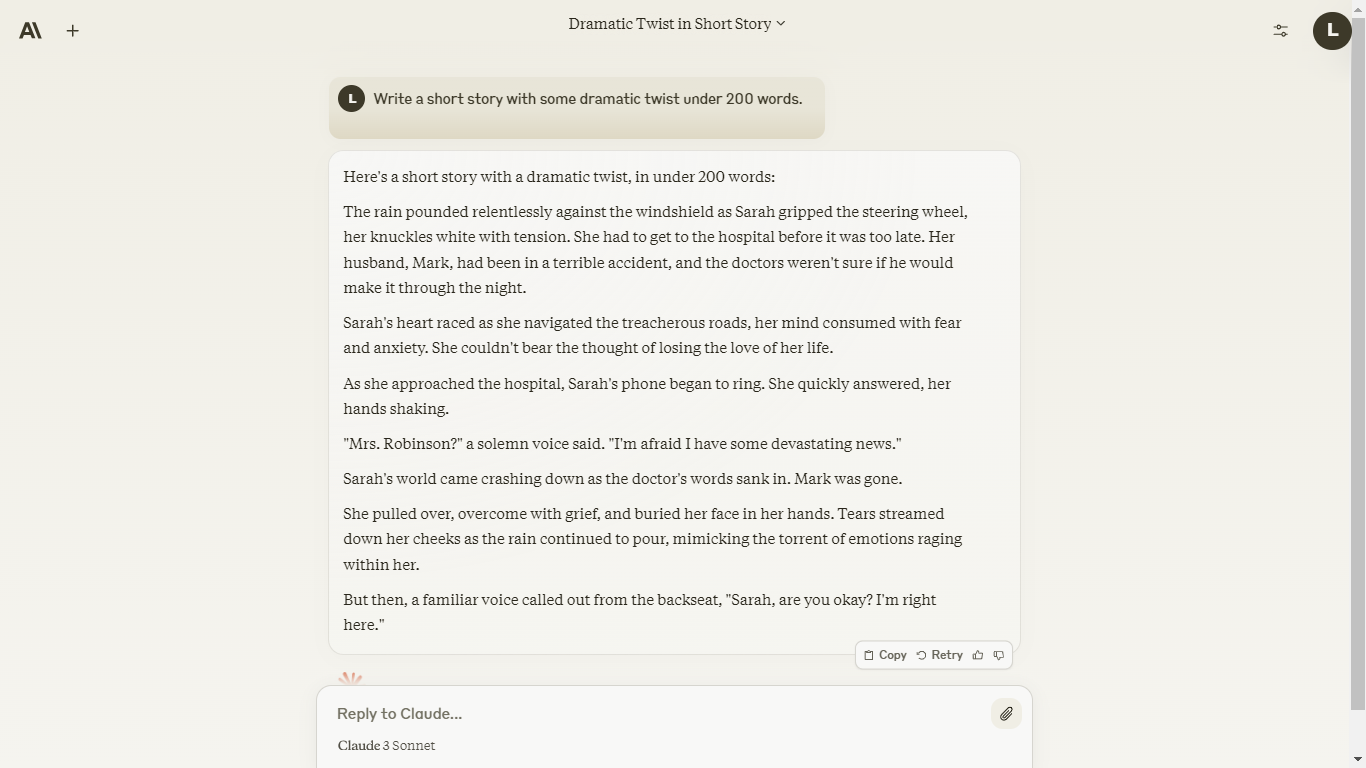
When I compared the answers, ChatGPT's dramatic turn wasn't very surprising. Here's an image that shows what ChatGPT generated as an output:
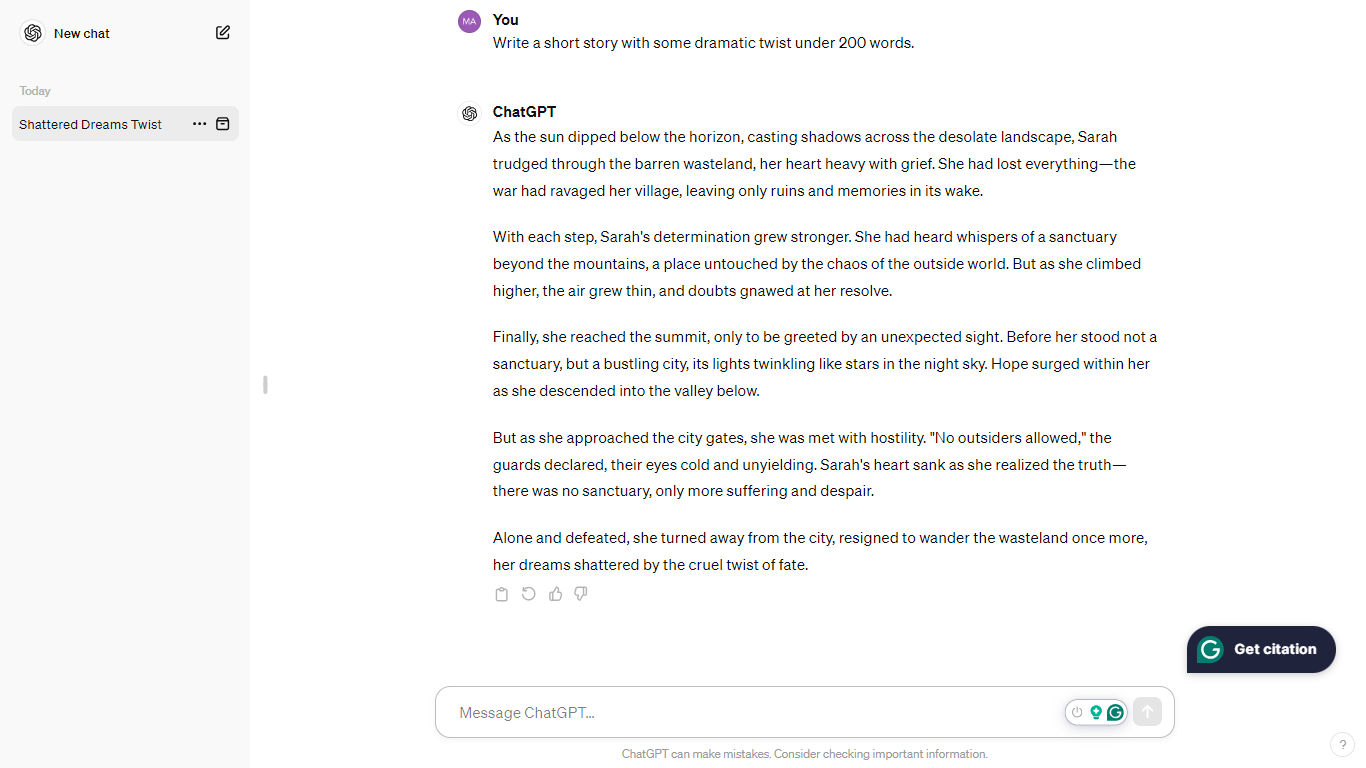
Claude 3 (the latest chatbot of Anthropic) and GPT-4 (the latest chatbot of OpenAI) are both proficient in analyzing photos. For example, if you're asking general questions about the images (Like, What's in the image?), you'll probably be satisfied with the answer.
#3 Integration
Claude integrates with most well-known apps, such as Notion AI, Slack, Zoom, DuckDuckGo DuckAssistant, and Quora's Poe — though more Google integrations are expected soon. For example, the Claude app can help summarize threads and answer questions in Slack. In March 2023, Claude opened up its API to connect with other applications.
ChatGPT is a versatile AI chatbot and can easily fit into different apps with the help of API. There are many plugins available for OpenTable, Shopify, Slack, Expedia, Kayak, and more. In addition, it works smoothly with many programming languages, which makes it more flexible and adaptable.
#4 Safety and security
You can't afford to lose your sensitive information, and if you want to use the AI chatbot for business, chances are you need a safe tool. At first glance, both ChatGPT and Claude provide some levels of security. However, they differ when we dig deeper.
For example, ChatGPT has basic security features but can pick up some biases from its training data. Plus, verifying the information generated by ChatGPT can also be tricky as it does not mention the sources (and even if it does, the source pages often show errors).
On the other hand, Claude AI takes security and data privacy to the next level. Constitutional AI is intended to discourage biased, toxic, or unethical answers to maximize positive impact. Claude's researchers ensured the responses were not preachy, overly reactive, and obnoxious. Anthropic also works with ARC (Alignment Research Center) to assess Claude's third-party safety.
#5 Pricing and plans
If you're a free user, ChatGPT is a good place to start. While Claude AI's free plan only allows a few responses per day, ChatGPT's free plan offers unlimited responses. When I compared the paid plans of ChatGPT Plus and Claude Pro, I found both charge $20 per month.
The paid ChatGPT Plus plan gives you a number of benefits, including general access to ChatGPT during peak times, priority access, and faster response times. On the other hand, Claude Pro's pricing structure can feel restrictive: its plan limits the number of questions you can ask per day (though it is five times more than the free tier).
Notta offers the most integrated AI meeting notes, summaries, and action items so nothing gets missed.
FAQs
Is Claude better than ChatGPT?
Claude AI can process more words than ChatGPT, which makes the chatbot better for long documents. In addition, Claude follows a more human and empathetic approach when answering questions. On the other hand, ChatGPT's output is more robotic and rational.
Is Claude based on ChatGPT?
Claude AI — or, more specifically, Claude 3 — is Anthropic's answer to ChatGPT. Just like ChatGPT, Claude is an AI chatbot powered by a large language model. However, ChatGPT was designed by OpenAI, whereas Claude was released by a different company, Anthropic.
What AI is better than ChatGPT 4?
Claude 3 Opus outperforms GPT-4 on many standardized tests that judge graduate-level reasoning (GPQA), grade school math (GSM8K), coding (HumanEval), and university-level knowledge (MMLU). However, it's also worth noting that Claude 3 is trained up to August 2023, whereas GPT-4's knowledge cutoff is April 2023.
Claude vs ChatGPT: The final verdict
If you're not sure whether ChatGPT or Claude best fits your needs, you can try ChatGPT, which is a simple and affordable chatbot with a sleek interface. If you want an honest and safe chatbot for your business, you can go with Claude AI chatbot.
With its constitutional AI model, Claude 3 is known to generate honest, harmless, and helpful answers. It won't be wrong to say that Claude is the advanced ChatGPT alternative that many teams and businesses use to generate safe and human-like responses to their questions.